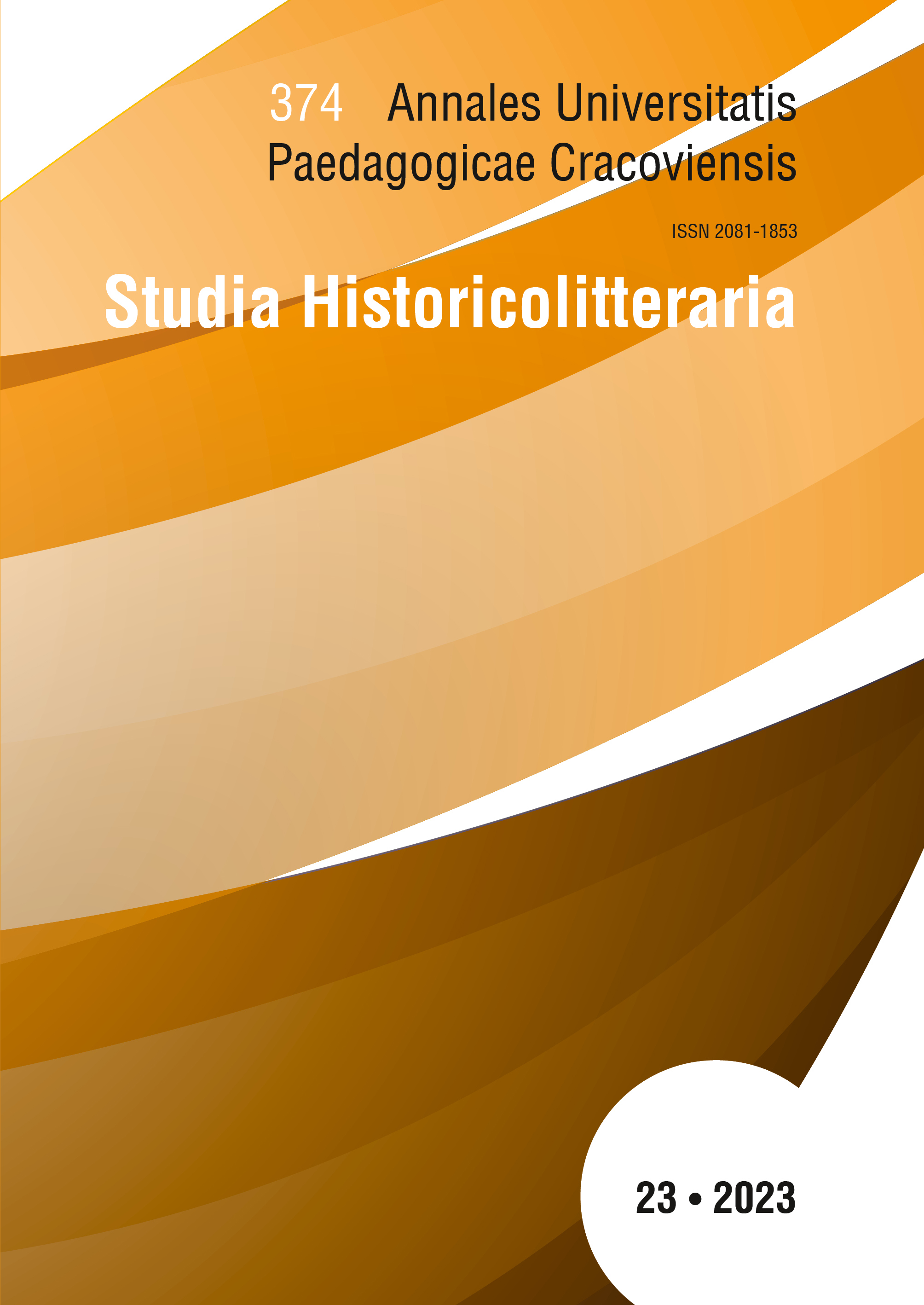Grunt to historia? Vicente Luis Mora i jego "Centroeuropa" (2020) jako metapowieść intrahistoryczna
Main Article Content
Abstrakt
The purpose of the essay is to introduce the figure of a contemporary Spanish author, Vicente Luis Mora, and his novel Centroeuropa to the Polish literary researchers, as well as to analyze the special character of this novel in terms of reading agreement and the most adequate terminology concerning the literary genre, to which it belongs, based on the form oftypological characteristics of a novel that includes ten essential points: paratext, plot, narration, time structure, poetics, the question of mimesis, the loyalty of history towards History, metatextuality, ideological character and the strategies used by the author. On the basis of these reflections it can be concluded that Centroeuropa by Vicente Luis Mora is a metanovel about a man who is looking for his way in a breakthrough moment in the history of Europe, between the 18th and 19th century, in the declining feudal‑absolutist Prussia and the emerging liberal‑capitalist Prussia, in the embryonic society, where economic and political norms haven’t been fully constructed yet and women are not full‑fledged members of society. Centroeuropa is a multi‑dimensional novel inspired by the past of Central Europe, but – above all – a metanovel about writing and its servitude.
Downloads
Article Details

Utwór dostępny jest na licencji Creative Commons Uznanie autorstwa – Użycie niekomercyjne – Bez utworów zależnych 4.0 Międzynarodowe.
POLITYKA PRAW AUTORSKICH
Wydawca „Annales Universitatis Paedagogicae Cracoviensis. Studia Historicolitteraria” jest upoważniony do korzystania oraz do rozpowszechniana wszystkich opublikowanych w czasopiśmie materiałów na podstawie umowy licencji niewyłącznej, zawartej uprzednio na czas nieoznaczony każdorazowo z autorem/ką konkretnego utworu na określonych w tamtejszej umowie polach eksploatacji.
POLITYKA OTWARTEGO DOSTĘPU
„Annales Universitatis Paedagogicae Cracoviensis. Studia Historicolitteraria” to czasopismo o otwartym dostępie, a cała jego zawartość jest dostępna bezpłatnie dla użytkowników i instytucji na zasadach licencji niewyłącznej CreativeCommons (CC BY-NC-ND 4.0). Użytkownicy/ki mogą czytać, pobierać, wykonywać kopie, rozpowszechniać, drukować, wyszukiwać lub linkować do pełnych tekstów artykułów w tym czasopiśmie bez uprzedniej zgody wydawcy lub autora/ki pod warunkiem podania źródła dostępu i autorstwa danej publikacji. Jest to zgodne z definicją otwartego dostępu BOAI (http://www.soros.org/openaccess).
Bibliografia
Barthes R., Dyskurs historii, przeł. A. Rysiewicz, Z. Kloch, „Pamiętnik Literacki” 1984, z. 3, s. 225–236.
Barthes R., Le discours de l’histoire, [w:] Le bruissement de la langue, Essais critiques IV, Paris 1967, s. 163–177.
Bremond C., Kombinacje syntaktyczne między funkcjami a sekwencjami narracyjnymi, przeł. W. Kwiatkowski, „Pamiętnik Literacki” 1968, z. 4, s. 285–291.
Cichocka M., Estrategias de la novela histórica contemporánea. Pasado plural, postmemoria, pophistoria, Frankfurt am Main 2016.
Fernández‑Prieto C., La Historia en la novela histórica, [w:] Reflexiones sobre la novela histórica, red. J.J. Morales, J. Jurado, Cádiz 2006, s. 165–184.
Genette G., Palimpsestes, Paris 1982.
Genette G., Palimpsesty: literatura drugiego stopnia, przeł. T. Stróżyński, A. Milecki, Gdańsk 2014.
Genette G., Seuils, Paris 1987.
González García J, „Centroeuropa” (2020) de Vicente Luis Mora: una mirada al mundo femenino desde el modelo de la „nueva masculinidad”, „Revista Letral” 2023, n. 30, s. 5–19.
Hutcheon L., A Poetics of Postmodernism: History, Theory, Fiction, New York 1988.
Hutcheon L., Historiographical Metafiction. Parody and the Intertextuality of History, [w:] Intertextuality and contemporary American fiction, eds. P. O’Donnell, R. Con Davis, Baltimore – London 1989, s. 3–32.
Kermode F., Sekrety i narracyjne sekwencje, przeł. P. Czapliński, „Pamiętnik Literacki” 1993, z. 2, s. 174–192.
Lefere R., La novela histórica: (re)definición, caracterización, tipología, Madrid 2013.
Martín J.M., Vicente Luis Mora: „Intento abrir los horizontes del lector en lugar de cerrarlos”, „Diario de Córdoba”, 29.09.2020, https://www.diariocordoba.com/cultura/2020/09/29/vicente‑luis‑mora‑abrir‑horizontes-35934724.html [dostęp: 15.06.2023].
Menton S., La Nueva Novela Histórica de la América Latina 1979–1992, México 1993.
Mora V.L., Ensayos a La Intemperie, „Trama & Texturas” 2018, n. 36, s. 15–32, https://www.jstor.org/stable/26524842 [dostęp: 15.06.2023].
Mora V.L., Centroeuropa, Barcelona 2020.
Rivas L.M., La novela intrahistórica: tres miradas femeninas de la historia venezolana, Valencia 2000.
Rodríguez D., La revista „Quimera” juega a ser un ‘hoax’ de internet en papel, „El País”, 24.09.2010, https://blogs.elpais.com/trending‑topics/2010/09/revista‑quimera‑hoax‑papel.html [dostęp: 11.11.2023].
White H., Metahistory: The Historical Imagination in Nineteenth Century Europe, Baltimore – London 1973.
White H., Problem narracji we współczesnej teorii historycznej, przeł. M. Wiewiórkowska, H. Ogryzko‑Wiewiórkowski, [w:] Metodologiczne problemy narracji historycznej, red. J. Pomorski, Lublin 1990, s. 25–61.
